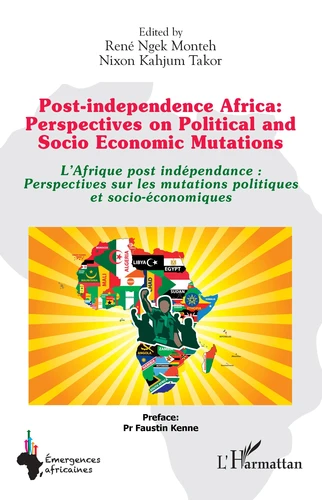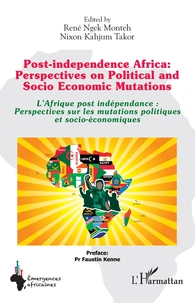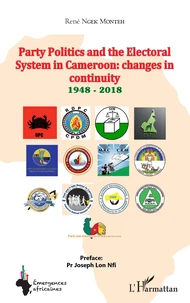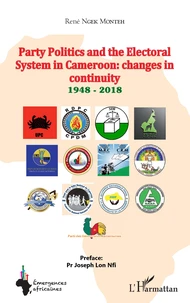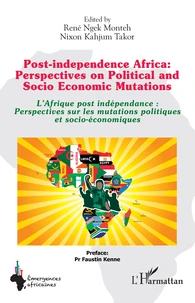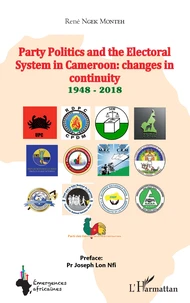René Ngek Monteh is an Associate Professor of History in the Department of History at the Higher Teacher Training College at the University of Yaoundé 1, Cameroon. He is a consultant at the International School for Security Forces and a visiting lecturer at the Pan-African University Institute of Governance, Humanities, and Social Sciences , alongside many other state and non-state universities. He has published a number of journal articles and books on conflict, security and peace studies.
Post - independence Africa: Perspectives on Political and Socio Economic Mutations. L'Afrique post indépendance : Perspectives sur les mutations politiques et socio - économiques
Par : ,Formats :
Disponible dans votre compte client Decitre ou Furet du Nord dès validation de votre commande. Le format ePub est :
- Compatible avec une lecture sur My Vivlio (smartphone, tablette, ordinateur)
- Compatible avec une lecture sur liseuses Vivlio
- Pour les liseuses autres que Vivlio, vous devez utiliser le logiciel Adobe Digital Edition. Non compatible avec la lecture sur les liseuses Kindle, Remarkable et Sony
 , qui est-ce ?
, qui est-ce ?Notre partenaire de plateforme de lecture numérique où vous retrouverez l'ensemble de vos ebooks gratuitement
Pour en savoir plus sur nos ebooks, consultez notre aide en ligne ici
- Nombre de pages310
- FormatePub
- ISBN978-2-14-048971-6
- EAN9782140489716
- Date de parution20/07/2023
- Copier Coller01 page(s) autorisée(s)
- Protection num.Digital Watermarking
- Taille11 Mo
- ÉditeurL'Harmattan
- PréfacierFaustin Kenne
Résumé
The colonial period and post-independence era are two exciting historical pegs with shared and diametrically opposed narratives on the people and continent of Africa. They are two periods with leverages of continuities and discontinuities. While the colonial period for the most part left the African people as passive recipients of European socioeconomic and political values, colonialism at the same time created strands of resistance that manifested variously as nationalism.
The outcome of the nationalist effervescence was the 'termination' of the colonial enterprise and the appropriation of political independence. The independence of most African states was accompanied by a craving to indigenize the political institutions and to orient development along African paradigms. This scholarly compendium of 15 chapters integrates different narratives on the state, stakes, and prospects of the African continent in responding to dynamic socio-economic and political exigencies.
The outcome of the nationalist effervescence was the 'termination' of the colonial enterprise and the appropriation of political independence. The independence of most African states was accompanied by a craving to indigenize the political institutions and to orient development along African paradigms. This scholarly compendium of 15 chapters integrates different narratives on the state, stakes, and prospects of the African continent in responding to dynamic socio-economic and political exigencies.
The colonial period and post-independence era are two exciting historical pegs with shared and diametrically opposed narratives on the people and continent of Africa. They are two periods with leverages of continuities and discontinuities. While the colonial period for the most part left the African people as passive recipients of European socioeconomic and political values, colonialism at the same time created strands of resistance that manifested variously as nationalism.
The outcome of the nationalist effervescence was the 'termination' of the colonial enterprise and the appropriation of political independence. The independence of most African states was accompanied by a craving to indigenize the political institutions and to orient development along African paradigms. This scholarly compendium of 15 chapters integrates different narratives on the state, stakes, and prospects of the African continent in responding to dynamic socio-economic and political exigencies.
The outcome of the nationalist effervescence was the 'termination' of the colonial enterprise and the appropriation of political independence. The independence of most African states was accompanied by a craving to indigenize the political institutions and to orient development along African paradigms. This scholarly compendium of 15 chapters integrates different narratives on the state, stakes, and prospects of the African continent in responding to dynamic socio-economic and political exigencies.

